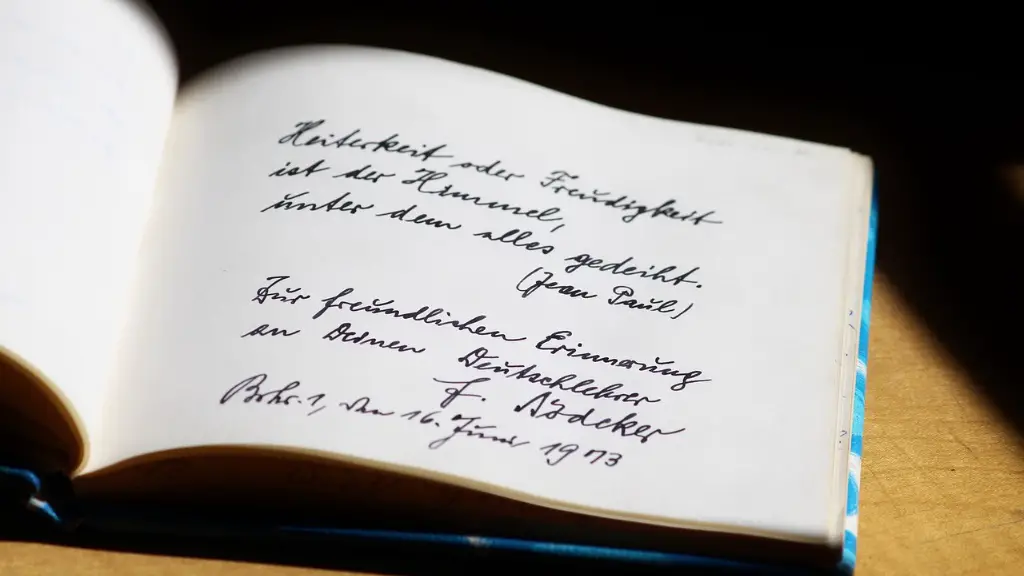Early Life of T.S Eliot
Thomas Stearns Eliot was born in St. Louis, Missouri on September 26, 1888. His father, Henry Ware Eliot, was a successful businessman and his mother, Charlotte Stearns Eliot, was a poet and editor. He had one younger brother and three sisters. As a child, he took a strong interest in the works of the French Symbolist poets, John Ruskin and Walter Pater, which put him on the road to becoming a poet himself.
Eliot was educated at Milton Academy and Harvard University and later attended the Sorbonne in Paris. As a student, he was a member of the literary society, the Cave Club and wrote for the Harvard Advocate. His first poem, “The Love Song of J. Alfred Prufrock,” was published in Poetry magazine in 1915.
In 1917, Eliot married Vivienne Haigh-Wood. He left Harvard with a doctoral degree in philosophy and moved to London, where he became a publisher of avant-garde poetry and later worked as a literary editor and critic. He wrote extensively about the modernist movement and was one of the most influential poets of the early 20th century.
T.S Eliot Poetic Style
T.S Eliot’s poetry is known for its rich use of imagery, symbolism and allusions. He often wrote in complex poetic forms such as the villanelle, sestina and sonnet. In his early poetry, he often drew upon the French Symbolist tradition, which emphasized the role of intuition and emotion in the creative process.
Eliot’s poem “The Waste Land” (1922) is one of the classic works of 20th-century modernism and is generally considered to be one of the greatest works of English-language poetry of the last century. The poem is composed of short fragments of verse in various meters, punctuated with dramatic interludes such as a funeral procession. The poem depicts a landscape of desolation in a decaying urban environment.
Eliot’s later poetry moved away from the French Symbolist model and towards a more lyrical and musical style. In some of his works, such as “Four Quartets” (1935-42), Eliot reflected on his own life and experience, and also drew on medieval Christian themes and popular spiritual traditions, such as Buddhism and Hinduism.
Influence of T.S Eliot
T.S Eliot’s influence extends beyond poetry. He was an ardent advocate of drama and published one of the most influential books on literary criticism, The Sacred Wood (1920), which established him as one of the preeminent critics of his time.
In 1948, Eliot was awarded the Nobel Prize for Literature for his writing. He was also knighted by Queen Elizabeth II in 1948, the first American poet to be honored in such a manner. His work has had a major influence on subsequent generations of poets and he has been cited as an influence by writers as varied as Seamus Heaney, Sylvia Plath, W.H. Auden and Derek Walcott.
T.S Eliot & Politics
Though T.S Eliot is best known as a poet, he was also an articulate political commentator. He had strong views on the importance of tradition, discipline, and order in society and was critical of contemporary social values. He was a conservative in politics, largely influenced by his Christian views.
Eliot was an advocate of the idea of collective action. He believed that a sense of common purpose and responsibility should exist between the individual and the community. He believed in the concept of self-correction and the ability of individuals to change for the better.
He was also critical of liberalism, individualism and progressivism, and was a fierce opponent of socialism. His views were met with considerable criticism, particularly from those on the left of the political spectrum who accused him of being elitist and out of touch with the needs of the working class.
Plays by T.S Eliot
In addition to his poetry, T.S Eliot also wrote a number of plays, including Murder in the Cathedral (1935), which tells the story of Thomas Becket’s death, and The Family Reunion (1939), which explores the theme of guilt and redemption.
Eliot’s plays are noted for their use of symbolism and metaphor. They explore themes such as faith and doubt, faith and reason, and time and eternity. Eliot’s plays have had a lasting influence on modern theatre and are regularly produced around the world.
T.S Eliot’s Death
T.S Eliot died in London in 1965, at the age of 76. He was memorialized in Westminster Abbey, alongside other major poets such as Shakespeare and Tennyson. His work continues to inspire readers and writers around the world.
Eliot’s writings have had a profound impact not only on poetry, but also on literature and the wider culture. He is remembered as one of the most influential and important figures in the 20th-century literary world.
T.S Eliot’s Legacy
T.S Eliot’s work has been tremendously influential on both the poetic tradition and wider culture. His use of allusion, metaphor, and symbolism has had a lasting impact on the way in which poetry is written and read.
The influence of his work extends to other art forms, including music, theatre, cinema, and painting. His influence can be seen in a wide range of modern poets, playwrights, and artists.
Perhaps most importantly, Eliot’s work has a timeless quality. His works continue to resonate with readers and remain powerfully relevant to the modern age.
Perspectives from Experts
What makes T.S Eliot so special is his ability to write about the human experience with a sense of irony and wit that is at once timeless and modern. Eliot has a unique ability to take a complex and difficult idea, and express it in an intense, memorable way.
Eliot’s work is an important example of poetry that engages with the difficult and often uncomfortable aspects of human existence. He offers an insightful view into the human psyche, one that allows readers to explore their deepest feelings and frustrations in a way that can be both humorous and profound.
Eliot is also praised for his brilliant use of language and imagery. He often creates vivid and powerful images that can touch the heart of the reader and make us look beyond our own experiences and consider new perspectives.
Analysis and Insights
What makes T.S Eliot’s poetry so powerful is his ability to present complex ideas in simple and evocative language. By combining symbolism and allusion, Eliot is able to explore the darkest parts of the human psyche with great insight and sensitivity.
Eliot’s writings have the power to move and transform us. He has the uncanny power to undermine our assumptions and challenge us to explore new directions and new possibilities. His works leave us with a sense of wonder, awe, and something that can only be called inspiration.
Eliot is also a master of the poetic form. His use of poetic techniques such as villanelles, sestinas, and sonnets have had a lasting influence and have become standards for modern poetry.
Finally, Eliot’s legacy extends beyond poetry to the various forms of art and culture. His writings have inspired generations of writers, thinkers, and artists, and will continue to shape our understanding and appreciation of the world for many years to come.





